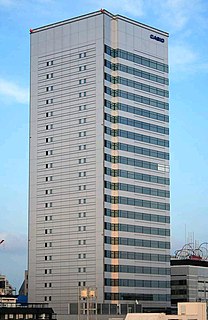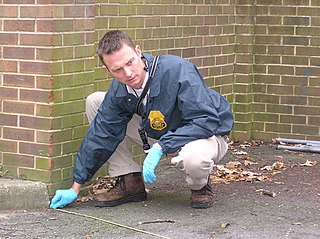
MIDI is a technical standard that describes a communications protocol, digital interface, and electrical connectors that connect a wide variety of electronic musical instruments, computers, and related audio devices for playing, editing and recording music. A single MIDI link through a MIDI cable can carry up to sixteen channels of information, each of which can be routed to a separate device or instrument. This could be sixteen different digital instruments, for example.

The Voyager program is an American scientific program that employs two robotic probes, Voyager 1 and Voyager 2, to study the outer Solar System. The probes were launched in 1977 to take advantage of a favorable alignment of Jupiter, Saturn, Uranus, and Neptune. Although their original mission was to study only the planetary systems of Jupiter and Saturn, Voyager 2 continued on to Uranus and Neptune. The Voyagers now explore the outer boundary of the heliosphere in interstellar space; their mission has been extended three times and they continue to transmit useful scientific data. Neither Uranus nor Neptune has been visited by a probe other than Voyager 2.

A weather or sounding balloon is a balloon that carries instruments aloft to send back information on atmospheric pressure, temperature, humidity and wind speed by means of a small, expendable measuring device called a radiosonde. To obtain wind data, they can be tracked by radar, radio direction finding, or navigation systems. Balloons meant to stay at a constant altitude for long periods of time are known as transosondes. Weather balloons that do not carry an instrument pack are used to determine upper-level winds and the height of cloud layers. For such balloons, a theodolite or total station is used to track the balloon's azimuth and elevation, which are then converted to estimated wind speed and direction and/or cloud height, as applicable.

A weather station is a facility, either on land or sea, with instruments and equipment for measuring atmospheric conditions to provide information for weather forecasts and to study the weather and climate. The measurements taken include temperature, atmospheric pressure, humidity, wind speed, wind direction, and precipitation amounts. Wind measurements are taken with as few other obstructions as possible, while temperature and humidity measurements are kept free from direct solar radiation, or insolation. Manual observations are taken at least once daily, while automated measurements are taken at least once an hour. Weather conditions out at sea are taken by ships and buoys, which measure slightly different meteorological quantities such as sea surface temperature (SST), wave height, and wave period. Drifting weather buoys outnumber their moored versions by a significant amount.

Casio Computer Co., Ltd. is a Japanese multinational consumer electronics and commercial electronics manufacturing company headquartered in Shibuya, Tokyo, Japan. Its products include calculators, mobile phones, digital cameras, electronic musical instruments, and analogue and digital watches. It was founded in 1946, and in 1957 introduced the world's first entirely electric compact calculator. It was an early digital camera innovator, and during the 1980s and 1990s, the company developed numerous affordable home electronic keyboards for musicians along with introducing the world's first mass-produced digital watches.
Swap or SWAP may refer to:

A MIDI controller is any hardware or software that generates and transmits Musical Instrument Digital Interface (MIDI) data to MIDI-enabled devices, typically to trigger sounds and control parameters of an electronic music performance.

A sound module is an electronic musical instrument without a human-playable interface such as a piano-style musical keyboard. Sound modules have to be operated using an externally connected device, which is often a MIDI controller, of which the most common type is the musical keyboard. Controllers are devices that provide the human-playable interface and which may or may not produce sounds of its own. Another common way of controlling a sound module is through a sequencer, which is computer hardware or software designed to record and play back control information for sound-generating hardware. Connections between sound modules, controllers, and sequencers are generally made with MIDI, which is a standardized protocol designed for this purpose, which includes special ports (jacks) and cables.

The E6B flight computer, nicknamed the "whiz wheel" or "prayer wheel", is a form of circular slide rule used in aviation and one of the very few analog calculating devices in widespread use in the 21st century.

Aeolus, or, in full, Atmospheric Dynamics Mission Aeolus, is an Earth observation satellite operated by the European Space Agency. It was built by Airbus Defence and Space and launched on 22 August 2018. ADM-Aeolus is the first satellite with equipment capable of performing global wind-component-profile observation and will provide much-needed information to improve weather forecasting. Aeolus is the first satellite capable of observing what the winds are doing on Earth, from the surface of the planet and into the stratosphere 30 km high.

Crime analysis is a law enforcement function that involves systematic analysis for identifying and analyzing patterns and trends in crime and disorder. Information on patterns can help law enforcement agencies deploy resources in a more effective manner, and assist detectives in identifying and apprehending suspects. Crime analysis also plays a role in devising solutions to crime problems, and formulating crime prevention strategies. Quantitative social science data analysis methods are part of the crime analysis process, though qualitative methods such as examining police report narratives also play a role.

A wind controller, sometimes referred to as a "wind synth", or "wind synthesizer", is a wind instrument capable of controlling one or more music synthesizers or other devices. Wind controllers are most commonly played and fingered like a woodwind instrument, usually the saxophone, with the next most common being brass fingering, particularly the trumpet. Models have been produced that play and finger like other acoustic instruments such as the recorder or the tin whistle. One form of wind controller, the hardware-based variety, uses electronic sensors to convert fingering, breath pressure, bite pressure, finger pressure, and other gesture information into control signals. Another form of wind controller uses software to convert the acoustic sound of an unmodified wind instrument directly into MIDI messages. In either case, the control signals or MIDI messages generated by the wind controller are used to control internal or external devices such as analog synthesizers or MIDI-compatible synthesizers, softsynths, sequencers, or even lighting systems.

Criminal investigation is an applied science that involves the study of facts that are then used to inform criminal trials. A complete criminal investigation can include searching, interviews, interrogations, evidence collection and preservation, and various methods of investigation. Modern-day criminal investigations commonly employ many modern scientific techniques known collectively as forensic science.
Orchestral enhancement is the technique of using orchestration techniques, architectural modifications, or electronic technologies to modify the sound, complexity, or color of a musical theatre, ballet or opera pit orchestra. Orchestral enhancements are used both to create new sounds and to add capabilities to existing orchestral ensembles.
The Australian Institute of Criminology (AIC) is Australia's national research and knowledge centre on crime and criminal justice. The Institute seeks to promote justice and reduce crime by undertaking and communicating evidence-based research to inform policy and practice.

Meteorological instruments are the equipments used to sample the state of the atmosphere at a given time. Each science has its own unique sets of laboratory equipment. Meteorology, however, is a science which does not use much lab equipment but relies more on on-site observation and remote sensing equipment. In science, an observation, or observable, is an abstract idea that can be measured and for which data can be taken. Rain was one of the first quantities to be measured historically. Two other accurately measured weather-related variables are wind and humidity. Many attempts had been made prior to the 15th century to construct adequate equipment to measure atmospheric variables.
Radical criminology states that society "functions" in terms of the general interests of the ruling class rather than "society as a whole" and that while the potential for conflict is always present, it is continually neutralized by the power of a ruling class. Radical criminology is related to critical and conflict criminology in its focus on class struggle and its basis in Marxism. Radical criminologists consider crime to be a tool used by the ruling class. Laws are put into place by the elite and are then used to serve their interests at the peril of the lower classes. These laws regulate opposition to the elite and keep them in power.
Nicole Leeper Piquero is an American criminologist and the Robert E. Holmes Jr. Professor of Criminology at the University of Texas at Dallas. She has been the associate provost for faculty development and program review there since 2015, and has held the position of Robert E. Holmes Jr. tenured professor there since 2016. A 2013 article in the Journal of Criminal Justice Education ranked her as one of the top five female academics publishing in respected criminology and criminal justice journals.

Public criminology, a concept closely tied with “public sociology”, draws on a long line of intellectuals engaging in public interventions related to crime and justice. It argues that the energies of criminologists should be directed towards "conducting and disseminating research on crime, law, and deviance in dialogue with affected communities." Its proponents see it as potentially narrowing "the yawning gap between public perceptions and the best available scientific evidence on issues of public concern," a problem they see as especially pertinent to matters of crime and punishment.














